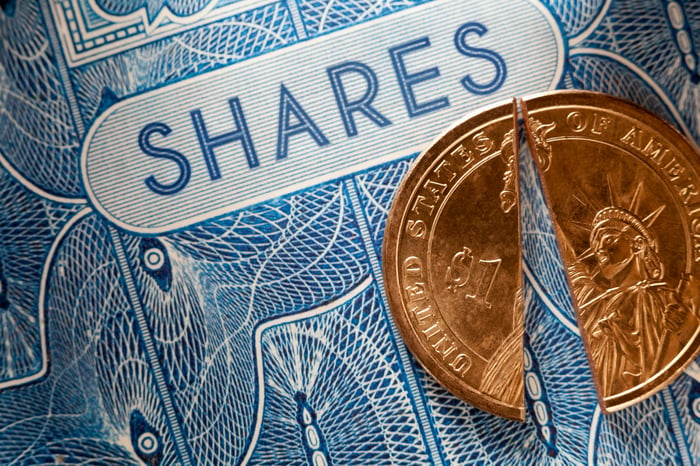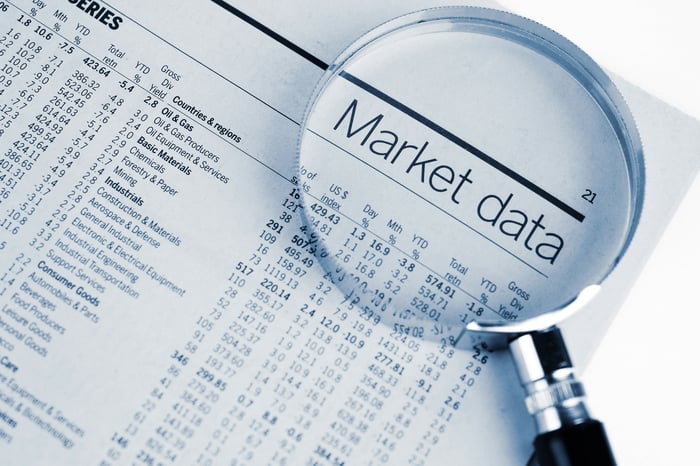|
|
|

|
|||||

|
|
Stock-split euphoria has played a pivotal role in pushing Wall Street's major stock indexes higher.
On the surface, Costco and Netflix -- which sport respective share prices nearing $1,000 and $1,300 -- have attributes indicative of a forward split.
However, various below-the-surface dynamics make it unlikely that either company becomes the blockbuster stock-split stock of 2025.
Though artificial intelligence (AI) has been the hottest thing since sliced bread on Wall Street since the fourth quarter of 2022, it's not the only trend helping to push the stock market's major indexes to record highs. Coming in a very close second to the AI revolution is the euphoria surrounding stock splits.
A stock split is an event that allows a publicly traded company to cosmetically alter its share price and outstanding share count by the same factor. These changes are surface scratching in the sense that they don't alter a company's market cap or affect its underlying operating performance in any way.
Where to invest $1,000 right now? Our analyst team just revealed what they believe are the 10 best stocks to buy right now. Learn More »
While stock splits can increase or decrease a company's share price, there's a milewide gap as to how investors commonly view these adjustments. Public companies aiming to increasing their share price via a reverse split are typically shunned by investors. Reverse splits are often conducted by struggling businesses that are trying to avoid being delisted from a major stock exchange.

Image source: Getty Images.
On the other end of the spectrum, investors regularly gravitate to public companies announcing and completing forward splits. This is the type of split designed to lower a company's share price to make it more nominally affordable for investors who can't buy fractional shares through their broker. Businesses that need to lower their share price to make their stock more accessible to everyday investors have a knack for out-innovating their peers and are usually firing on all cylinders from an operating standpoint.
Best of all, companies enacting forward splits offer a rich history of outperformance. Based on an analysis from Bank of America Global Research, since 1980, companies completing forward splits have averaged a 25.4% return in the 12 months following their initial announcement. This compares to a more modest 11.9% average one-year return for the benchmark S&P 500 over the same period.
This superior return has investors attempting to guess which high-flying company will become Wall Street's next stock-split stock.
While three brand-name businesses have already taken the plunge in 2025, some investors are looking to warehouse club Costco Wholesale (NASDAQ: COST) or streaming-services juggernaut Netflix (NASDAQ: NFLX) to be this year's blockbuster stock split. But as you're about to see, it takes more than a high nominal share price to encourage a company to split its stock.
On the surface, both companies would appear to pass the sniff test as logical candidates to announce a forward split. Costco is a stone's throw from $1,000 per share and hasn't conducted a forward split since January 2000.
As for Netflix, its shares are tipping the scales at almost $1,300. When Netflix last split its stock in July 2015, its share price had been hovering around $700. Investors who lack access to fractional-share purchases through their broker could struggle to open or add to a position in both companies.
But dig beneath the surface and you'll discover why neither Costco Wholesale nor Netflix are eager to become Wall Street's next stock-split stock.

Image source: Getty Images.
The simple reason Costco makes for a poor candidate to split its stock is that its management team doesn't feel it's necessary.
In December, Melius Research analyst Karen Short asked Costco execs during the company's fiscal first-quarter conference call if a stock split was being considered. Here's how Chief Financial Officer (CFO) Gary Millerchip replied:
On the stock split, you're probably aware that Costco has done stock splits in the past. And it's something that we'll continue to evaluate and discuss with our board, but there isn't a plan at this time for a stock split.
I think for us, the way we think about it is the economic arguments that we're true in the past are a little bit less clear because retail investors and employees both have the ability now to buy fractional shares. But we also recognize that there's a benefit of the stock feeling more affordable for our retail investors and employees who are very important constituents for us. So, we'll continue to evaluate over time.
In other words, Costco's executives and board members believe access to fractional-share buying is so prevalent that a stock split simply doesn't carry the same weight it did when the company last completed a split 25 years ago. Until Costco's board and executives feel that everyday investors and/or its employees are missing out, a stock split is unlikely.
A stock split is also unlikely, at least in the coming months, for streaming-services provider Netflix, but for a different reason than that given by Costco's CFO.
Retail investors are usually the driving force behind a forward split -- and they're the main reason Netflix is unlikely to announce one.
The issue for Netflix is that institutional investors (e.g., hedge funds, custodial investment banks, and passive funds) own the bulk of its outstanding shares. As of this writing on July 4, 80.2% of outstanding shares are held by institutional investors, brokerage firms, and various strategic entities, while the remaining 19.8% are held by retail investors.
Institutional investors who are managing millions, billions, or trillions of dollars in assets aren't in need of a lower nominal share price to purchase Netflix stock.
If there's a silver lining here, it's that retail investor ownership of almost 20% isn't exceptionally low and could still be enough to trigger action by Netflix's board sooner than later (i.e., perhaps over the next year or two). In comparison, companies like AutoZone, FICO, and Booking Holdings all sport retail investor ownership levels of only 10% or 11%. There's simply no incentive or urgency for the boards of these companies to announce a split, even with respective share prices that are considerably higher than Netflix.
Before you buy stock in Costco Wholesale, consider this:
The Motley Fool Stock Advisor analyst team just identified what they believe are the 10 best stocks for investors to buy now… and Costco Wholesale wasn’t one of them. The 10 stocks that made the cut could produce monster returns in the coming years.
Consider when Netflix made this list on December 17, 2004... if you invested $1,000 at the time of our recommendation, you’d have $699,558!* Or when Nvidia made this list on April 15, 2005... if you invested $1,000 at the time of our recommendation, you’d have $976,677!*
Now, it’s worth noting Stock Advisor’s total average return is 1,060% — a market-crushing outperformance compared to 180% for the S&P 500. Don’t miss out on the latest top 10 list, available when you join Stock Advisor.
*Stock Advisor returns as of July 7, 2025
Bank of America is an advertising partner of Motley Fool Money. Sean Williams has positions in Bank of America. The Motley Fool has positions in and recommends Bank of America, Booking Holdings, Costco Wholesale, and Netflix. The Motley Fool recommends Fair Isaac. The Motley Fool has a disclosure policy.
| 1 hour | |
| 1 hour | |
| 1 hour | |
| 1 hour | |
| 1 hour | |
| 1 hour |
Paramounts Newest Bid Could Open Door to Beating Netflix Deal, Warner Says
NFLX
The Wall Street Journal
|
| 2 hours | |
| 2 hours | |
| 2 hours | |
| 2 hours | |
| 2 hours | |
| 2 hours | |
| 4 hours | |
| 4 hours | |
| 5 hours |
Join thousands of traders who make more informed decisions with our premium features. Real-time quotes, advanced visualizations, backtesting, and much more.
Learn more about FINVIZ*Elite